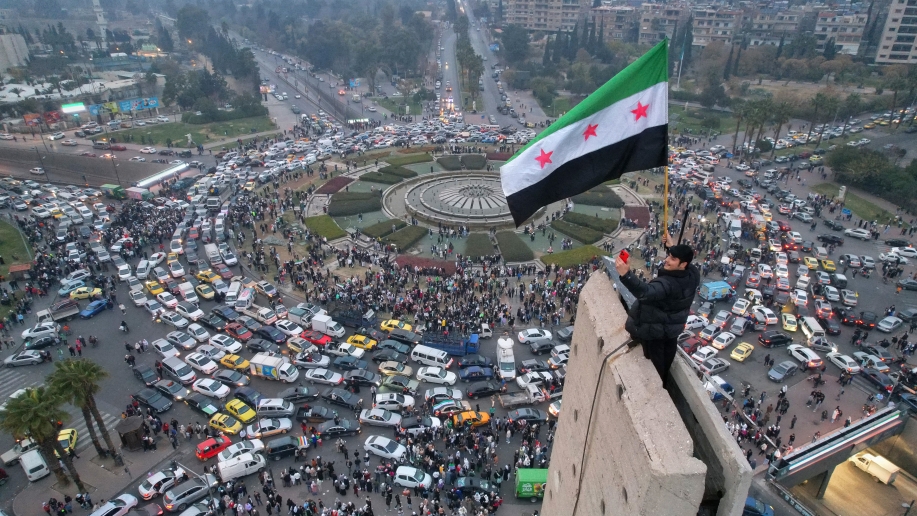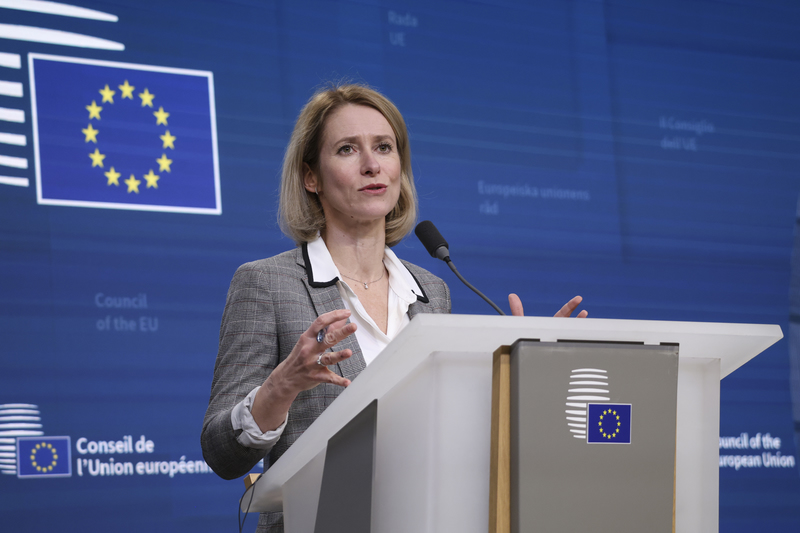Kaja Kallas, the new EU High Representative for Foreign Affairs and Security Policy, chaired her first Foreign Affairs Council meeting with EU foreign ministers on Monday with Syria, Ukraine, and Georgia as the main issues on the agenda.
“I can tell you, it is different than the European Council,” she said at her press remarks at the following press conference. “And you know, it was the first, so we can always do better.“ Despite that, the Council made some progress and managed to agree on some decisions.
The Council discussed Russia’s aggression against Ukraine after a video intervention by Ukraine's Minister of Foreign Affairs, Andrii Sybiha. The most important decision was the adoption of the 15th package of individual and economic restrictive measures against Russia.
“This round targets the shadow fleet and North Korean officials, and for the first time also Chinese firms making drones for Moscow,” Kaja Kallas said. Our message is very clear, you cannot fuel a war in Europe and get away with it.”
The focus of the package is to keep cracking down on Russia's shadow fleet, as well as combating sanctions' circumvention. It targets 52 new vessels, increasing the total number of such listings to 79. These vessels (non-EU) are subject to a port access ban and a ban on provision of services. The ships have been transporting Russian oil, arms, stolen grain, or supporting the Russian energy sector.
The sanctions on Chinese actors (travel ban, asset freeze and prohibition to make economic resources available) target one individual and two entities facilitating the circumvention of EU sanctions, and four entities supplying sensitive drone components and microelectronic component to the Russian military industry in support of Russia's war against Ukraine.
The new sanctions also include two senior officials from North Korea because of its support to Russia’s war by deploying troops to Russia.
The EU has by now trained 75,000 Ukrainian troops. Kallas stressed the need to continue to support Ukraine militarily. “We all heard him (Ukraine’s foreign minister) loud and clear: Ukraine needs more ammunition, stronger air defence and more support for its own defence industry as well.
“We must give Ukraine what it needs to win this war . . . The stronger they are on the battlefield, the stronger they are also behind the negotiation table . . . Putin will not stop, unless he's stopped.”
The EU is also following the latest developments in Syria after the fall of the Assad regime and is reaching out to the new leadership in Damascus. Kallas herself participated last weekend in an international meeting in Jordan with the foreign ministers of Arab countries, the US and Turkey do discuss the basic principles of engagement with the new leadership.
For the time being the contacts is on a relatively low level until the direction of the Islamist militia, Hayat Tahrir al-Sham (HTS), which overthrew the Assad regime, has become clear and its hopeful announcements about a better future for Syria are matched by actions on the ground.
The Head of the EU delegation to Syria - currently stationed in Lebanon – has travelled to Damascus with the aim of building contact with the country's new authorities and convey the EU’s messages. If the new regime takes step in the right direction in the coming months, the EU will be ready to adapt its current sanctions policy against Syria.
The new leadership is saying the right things but the future is uncertain, Kallas said. “Extremism, Russia and Iran should not have a place in Syria's future.” She added that the EU needs to see that there is no more revenge and civil war in Syria.

Credit: Belga
The Council discussion highlighted EU agreement on the principles of territorial integrity, independence and sovereignty of Syria, as well as accountability, inclusiveness, respect of the minorities and women's rights. The ministers confirmed that the transition process need to be Syria-led and Syrian-owned, and reflect the Syrian people in all of its diversity.
Until now the future of the Autonomous Kurdish Administration in north-east Syria, which controls ca 25 % of Syria’s territory, has hardly been addressed by the EU. Kallas stressed the importance of freedom of religion but did not mention local self-government. A high-level EU official said at a press briefing last Friday that it was not a matter of reconciling the above principles for Syria’s future.
While cautiously reaching out to the new leadership in Syria, the EU remains the biggest humanitarian aid donor to the Syrian people. On Friday, the EU opened a new humanitarian air bridge for 100 tons of humanitarian aid to support health, education, and shelter in Syria. The supplies will be transported to Adana in Turkey from where they will be distributed across the border to Syria.
The Council also reiterated the need for a ceasefire in Gaza, the release of all hostages and the delivery of sufficient and unimpeded humanitarian aid. EU needs to have a dialogue with Israel to push for the two-state solution, Kallas said. Her proposal for a meeting of the EU - Israel Association Council was supported by Ministers. The first High-Level Dialogue with the Palestinian Authority will also take place.
The recent development in Georgia was also on the agenda. Its government announced recently of its intention to suspend the country’s EU accession process until 2028. “The situation is not going in a positive direction for the Georgian people,” Kallas said. “Democracies do not oppress opposition voices or curtail the freedom of media.”
The EU has downgraded political contacts and cut funding for the Georgian government. There is also an agreement on the need to halt the visa free regime for Georgian diplomatic passport holders. After Hungary and Slovakia blocked sanctions against Georgia, The Commission will table a new proposal on this already this year. That said, the EU will continue to stand with the Georgian people. by redirecting funding from the authorities towards civil society and independent media.
M. Apelblat
The Brussels Times

